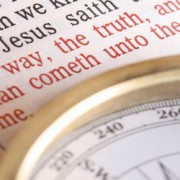Soteriology in the Middle (Part III)
“For God so loved the world that He gave His only begotten Son, that whoever believes in Him should not perish but have everlasting life.” John 3:16
In this post, my third and final post on soteriology, I wanted to think about the atonement. Along with the resurgence of Calvinism and the dawning of what some call Neo-Calvinism in recent years, there has been an accompanying resurgence of a debate that has been going on amongst Christians for hundreds of years- the extent of the atonement.
Wayne Grudem defines the atonement this way:
“The atonement is the work Christ did in his life and death to earn our salvation. This definition indicates that we are using the word atonement in a broader sense than it is sometimes used. Sometimes it is used to refer only to Jesus’ dying and paying for our sins on the cross. But…since saving benefits come to us from Christ’s life, we have included that in our definition as well.”[1]
Norman Geisler defines the atonement as “the substitutionary death of Jesus on behalf of our sins, whereby the just died for the unjust in order that God’s justice may be satisfied and His mercy justify the unjust.”[2]
The idea of the atonement as articulated by the above theologians reflects the biblical teaching of the doctrine of atonement well. The Bible tells us that God created human beings to know Him and to be known by Him in a relationship of peace, unity, and love.[3] But our first human parents disobeyed the commands of God which were given to protect mankind and preserve the relationship with God they’d been graciously given.[4] As a result all human beings are sinners from their core. All humans break the law and heart of God in their actions, desires, and imagination on a daily basis. This is the case because having a sin nature we are bound by natural inclination toward sin. This is the result of inheriting a corrupt nature from Adam and Eve, sort of like human children that contract deadly diseases from parents who have engaged in sinful activities which have compromised their own health.[5]
Because of mankind’s sinful nature and sinful actions all humans deserve to experience the judgment of God.[6] When someone breaks the law in human society it is common knowledge to us all that the guilty deserve to experience the consequences of breaking the law. The Bible tells us that breaking God’s holy law carries with it the death penalty.[7] This includes the experience of physical death upon which our soul separates from our bodies,[8] spiritual death in which our souls are separated from relational peace with God,[9] and the second death which is the experience of eternal conscious torment of body and soul in hell.[10]
The good news for humanity in spite of our sinful condition and guilt before God is that the atonement is real, and its benefits are available to us through faith in Jesus. Jesus lived a perfect life for us where we could not. Though sinless,[11] He died in our place for our sins[12] on the cross experiencing and satisfying the penalty we deserved to undergo as spiritual criminals who have broken God’s holy law.[13] In doing so He soaked up the wrath of God due us like a sponge absorbs water.[14] He rose again from the dead conquering Satan, sin, demons, death, and hell on our behalf.[15] Those who recognize their need for His penal substitutionary death accomplished in their place, and trust that it was sufficient to provide for their forgiveness and acceptance by God apart from any ritualistic, religious, or moral works performed by them are indeed forgiven, and experience the gift of new birth (regeneration).[16]
THE DEBATE
All Christians agree that the benefits experienced by those who have the atonement of Christ applied to them through trusting in Jesus are truly blessed with undeserved amazing grace. They agree that only those who believe in the biblical gospel get to experience the merits of Christ’s atonement. The debate amongst Christians is in regard to the extent of Christ’s atonement. Who does Jesus actually intend and desire to experience the merits of His atonement made on the cross? When He voluntarily died on the cross did He intend to provide atonement for all individual sinners, or only the elect?
Some would affirm the doctrine of Limited Atonement or Particular Redemption which declares that Jesus died in a saving (atoning) way for the elect only. Others would say that Jesus’ atonement is intended for and sufficient to save all individual sinners, but it is only efficient for those who respond to the gospel in faith. This is what we would call the Universal Atonement view. This latter view is not to be confused with Universalism which is a heretical view that has seen a recent rise in popularity in America due to the teaching of certain influential pastors. Universalism basically teaches that since Jesus died for all people, all people will ultimately be saved and make it into heaven. All biblical and gospel believing Christians reject such a view as heretical and demeaning to Jesus and the justice of God. This being the case, Universalism will not be discussed in the rest of this post in detail.
Calvinism on the Atonement
On the Limited Atonement side of this debate are theologians such as John Owen. He expressed the common reasoning behind Calvinist thinking on the atonement this way:
“The Father imposed His wrath due unto, and the Son underwent punishment for, either: (1) All the sins of all men, (2) all the sins of some men, or (3) some of the sins of all men. In which case it may be said: That if the last be true, all men have some sins to answer for, and so, none are saved. That if the second be true, then Christ, in their stead suffered for all the sins of all the elect in the whole world, and this is the truth. But if the first be the case, why are not all men free from the punishment due unto their sins? You answer, “Because of unbelief.” I ask, Is this unbelief a sin, or is it not? If it be, then Christ suffered the punishment due unto it, or He did not. If He did, why must that hinder them more than their other sins for which He died? If He did not, He did not die for all their sins!”[17]
Similarly, John Piper articulates his belief in Limited Atonement this way:
“Christ died for all the sins of some men. That is, he died for the unbelief of the elect so that God’s punitive wrath is appeased toward them and His grace is free to draw them irresistibly out of darkness into His marvelous light.”[18]
Neo-Calvinism on the Atonement
Though by his own admission he doesn’t appreciate the title, Mark Driscoll is held up by many as the poster-child for what is being called New Calvinism or Neo-Calvinism, and his view on the atonement which he terms Unlimited-Limited Atonement is increasingly becoming a predominant view of the atonement held by young Reformed Christians. In explaining Unlimited-Limited Atonement Driscoll writes:
“At first glance, Unlimited and Limited Atonement are in opposition. But, that dilemma is resolved by noting two things. First, the two categories are not mutually exclusive; since Jesus died for the sins of everyone that means that He also died for the sins of the elect. Second, Jesus’ death for all people does not accomplish the same thing as His death for the elect. This point is complicated, but is in fact taught in Scripture (1 Tim. 4:10; 2 Peter 2:1).
Simply, by dying for everyone, Jesus purchased everyone as His possession and He then applies His forgiveness to the elect by grace and applies His wrath to the non-elect. Objectively, Jesus’ death was sufficient to save anyone, and, subjectively, only efficient to save those who repent of their sin and trust in Him. This position is called Unlimited Limited Atonement or Modified Calvinism.
Therefore, Modified Calvinists like the Mars Hill elders do not believe anything different than Arminians; we simply believe what they believe and more. Lastly, perhaps the Old Testament sacrificial system provides the best illustration of this both/and position. The High Priest would offer a sacrifice for the sins of the whole nation on the Day of Atonement; this is, in effect, unlimited atonement. Then, each worshipper would repent of their own sins as demonstrated by the giving of their own sacrifices for their sins; this is, in effect, limited atonement.”[19]
The Bible on the Atonement
Personally, I think the Unlimited-Limited Atonement position has far more to commend it biblically than the traditional view of Limited Atonement. My differences with Driscoll’s view aren’t in regard to the extent of the atonement but are over the means of the application of the atonement. While Driscoll affirms a version of Universal Atonement he also affirms the classic Reformed understanding of Irresistible Grace which, in my opinion, wrongly teaches that regeneration precedes faith (see Part II of this series of posts on www.crossconnection.net for discussion of this). I would part ways with him on that point. But in regard to the biblical witness on the extent of the atonement I believe Driscoll is right on, and that his Calvinist comrades have real challenges in squaring the intricate details of their Limited Atonement view with some clear statements of scripture on the issue.
Compelling Verses
As a formerly committed Five Point Calvinist let me give you some of the verses I found compelling (or troubling) as I began to shift to a universal understanding of the intent of the atonement.
1 John 2:2- “My little children, these things I write to you, so that you may not sin. And if anyone sins, we have an Advocate with the Father, Jesus Christ the righteous. And He Himself is the propitiation for our sins, and not for ours only but also for the whole world.”
John is addressing believers in these verses. This is clear from the phrase “my little children” as well as the context of the entire book of First John. Here he clearly says that Jesus’ death was not just for those who were believers already, but for those of “the whole world” also. The common explanation of John’s meaning offered by those who believe in Limited Atonement is that he didn’t mean every individual person when he used the term “world.” Instead they say he meant the believers to whom he was writing and all the other believers in Christ living in different parts of the world. One of the glaring problems with this interpretation is that in the context of his book John tells us that the “world” does not represent God’s people, but in fact represents the realm, influences, and practitioners of evil throughout the globe. Later in this same chapter John tells exactly what the “world” is to him:
“Do not love the world or the things in the world. If anyone loves the world, the love of the Father is not in him. For all that [is] in the world–the lust of the flesh, the lust of the eyes, and the pride of life–is not of the Father but is of the world. And the world is passing away, and the lust of it; but he who does the will of God abides forever. Little children, it is the last hour; and as you have heard that the Antichrist is coming, even now many antichrists have come, by which we know that it is the last hour.”[20]
According to John the “world” for whom Christ died is the entire world of evil influence, antichrists (non Christians), and the sinful impulses common to every member of the human race. It is strange that some would try to designate the concept of the “world” in verse two as other believers living in places different from the audience to whom John was writing when John describes the world in such depraved, sinful, and unregenerate terms.
2 Peter 2:1- “But there were also false prophets among the people, even as there will be false teachers among you, who will secretly bring in destructive heresies, even denying the Lord who bought them, [and] bring on themselves swift destruction.”
Here the apostle Peter is beginning a long section of Scripture detailing the marks, work, and fate of false teachers. He will go on to explain that because they’ve led many astray from the truth of God that they will ultimately “utterly perish in their own corruption.”[21] The thing we need to notice here is that these false teachers who are destined to utterly perish according to Peter were apparently “denying the Lord who bought them” by teaching a false gospel and denying Christ. When Peter uses the term bought he is employing the language of redemption in reference to false teachers he believed would ultimately experience the eternal judgment of God!
If everyone for whom Christ died will ultimately be saved, how is it that these false teachers will utterly perish even though they were purchased by Christ? Clearly this is a challenge for advocates of Limited Atonement which is sometimes called Effectual Atonement because this system conveys the idea that all for whom Christ died will effectually be drawn to Him for salvation. Apparently that was not the case for these false teachers who were bought by Christ.
In response some Calvinists say that the false teachers weren’t really bought by Christ on the cross. Instead, in an effort to find a way to cling to their doctrinal system in the face of such clear teaching, they insist that what Peter meant is that they were identified with those bought by Christ merely because they associated themselves with God’s people. The problem with that idea is that it is not what the verse says. Scripture says the Lord “bought them.” It doesn’t say they were merely associated with those who were actually bought.
John 3:16- “For God so loved the world that He gave His only begotten Son, that whoever believes in Him should not perish but have everlasting life.”
This is a favorite verse of advocates of Universal Atonement. To them it affirms undeniably that Jesus was given to the death of the cross for the sins of all individuals in the world. It affirms that Jesus’ death was atoning and intended for the entire human race, but that only those who believe out of the human race actually receive the benefits of the atonement applied to them for salvation. In response, adherents of Limited Atonement say that what John meant was that God gave His Son for the elect scattered throughout the entire world, and not every individual sinner in the world.
J.C Ryle ably refutes the interpretation of this verse offered by advocates of Limited Atonement in his commentary on John. Since Ryle makes the case for the universal meaning of John 3:16 so clearly, allow me to quote him extensively on this point.
“Some think…that the word ‘world’ here means God’s elect out of every nation, whether Jews or Gentiles, and that the ‘love’ which God is said to love them is that eternal love with which the elect were loved before creation began, and by which their calling, justification, preservation and final salvation are completely secured. –This view, though supported by many great divines, does not appear to me to be our Lord’s meaning. For one thing, it seems to me a violent straining of language to confine the word ‘world’ to the elect. ‘The world’ is undoubtedly a name sometimes given to the ‘wicked’ exclusively. But I cannot see that it is a name ever given to the saints.—For another thing, to interpret the word ‘world’ of the elect only is to ignore the distinction which, to my eyes, is plainly drawn in the text between the whole of mankind and those out of mankind who ‘believe.’ If the ‘world’ means only the believing portion of mankind, it would have been quite enough to say, ‘God so loved the world, that He gave His only begotten Son, that the world should not perish.’ But our Lord does not say so. He says, ‘that whosoever believeth, i.e., that whosoever out of the world believeth.’ –Lastly, to confine God’s love to the elect, is taking a harsh and narrow view of God’s character, and fairly lays Christianity open to the modern charges brought against it as cruel and unjust to the ungodly. If God takes no thought for any but His elect, and cares for none besides, how shall God judge the world?”[22]
1 Timothy 4:10- “…the living God…is the Savior of all men, especially those who believe.”
Paul teaches the same thing here that John does in John 3:16. Though God is especially the Savior of believers (the elect) because the merits of the atonement are actually applied to them through faith, He is also the Savior of all individuals because His atonement was sufficient for their salvation as well. The difference between those Jesus is “especially” the Savior of and those He’s not especially the Savior of isn’t about who His atonement was intended for; it’s about who believes the gospel so that the atonement may be applied to them.
What About Verses that Teach Jesus’ Death was Specifically for Christians?
Some claim there is biblical support for Limited Atonement in verses that specifically describe Jesus’ atonement as being accomplished for His people without reference to unbelievers. An example of such a verse would be Acts 20:28: “…shepherd the church of God which He purchased with His own blood.”
Advocates of Limited Atonement point out that this verse says Jesus (God) purchased “the church” with His own blood, and not all individuals. While it is true that it says Jesus purchased His church with His blood, it is also true that it doesn’t say that Jesus didn’t purchase those who don’t come to faith in Him. In light of the universal language of other clear passages of Scripture it would be perfectly reasonable to affirm that Paul has in mind those who actually benefit from Christ’s redeeming work on the cross through faith, while not denying that He also died for those who don’t come to faith as well (such as the false teachers in 2 Peter 2:1). It is an inference to say that since Paul affirms that Jesus died for His church that he is also saying Jesus didn’t die for anyone else. We use language like this every day in communicating with one another. For instance, when I say “I love my wife and work to provide a livelihood for her.” it doesn’t follow that I don’t love my daughter and also provide a livelihood for her through my work.
Answering the Big Question
When you get into a discussion on the extent of the atonement the proponents of Limited Atonement almost always fall back on the same question. This question was popularized by Calvinist theologian John Owen and was noted earlier in this post. To quote Owen again, he asked, “…why are not all men free from the punishment due unto their sins? You answer, ‘Because of unbelief.’ I ask, Is this unbelief a sin, or is it not? If it be, then Christ suffered the punishment due unto it, or He did not. If He did, why must that hinder them more than their other sins for which He died? If He did not, He did not die for all their sins!”[23]
While at first glance this question might seem to pin the believer in Universal Atonement with a logical problem from which they cannot escape without becoming particular redemptionists, this is not the case. Two things need to be pointed out in response to Owens’ famous logic problem. First of all, whether or not the teaching of Scripture is easily graspable within the confines of what we consider human logic isn’t the issue. The question of the truth of a doctrine isn’t resolved by whether or not it is logical to us, but whether or not it is actually taught in Scripture whether it makes sense to us or not. The truth is that the Bible affirms that there are infinite spiritual realities that are true, and to which we are subject that we cannot understand in our finiteness.[24] For example, consider the reality of the Trinity. The Bible affirms that the Father is God, the Son is God, the Spirit is God, there’s only One God, and that the Father, Son, and Spirit are not each other. Is that beyond human logic? Absolutely! Is it true and affirmed by all biblical Christians? Yes! Why should we not approach understanding and explaining the biblical data on the extent of the atonement with the same humility and trust in the Scriptures?
Secondly, the question is based on a faulty view of the application of redemption. It muddies the water and places the provision and the application of redemption as occurring simultaneously at the cross. If this is true, the elect were forgiven for their sins at the moment the atonement was made for them when Jesus died on the cross. On the contrary, the Bible seems to teach that though the provision was secured for our forgiveness through the atonement at the moment it was accomplished on the cross, the application of the provision isn’t granted until we believe the gospel during the course of our lives.[25]
As far as the sin of unbelief itself is concerned, to be sure, it is a sin for which we stand deserving of judgment like every other sin. But “faith comes by hearing and hearing by the Word of God.”[26] And when faith is enabled through the power of God’s Word and a sinner repents of the sin of unbelief, the merits of the atonement are applied to them and they are forgiven for their prior unbelief as well as every other sin they’d committed to that point, or will commit in the future. The promoters of Limited Atonement are the ones who want to make unbelief a special category of sin. If we distinguish rightly between the time that the provision of atonement is made for all sins (the cross) and the time that the application of the provision is granted (faith and conversion) we come out biblical and without conflict and confusion. But whether it feels logical to us or not the Bible is clear that those who experience God’s judgment do not do so because atonement was not made for them, but because they refuse to believe that it has.
“Of how much worse punishment, do you suppose, will he be thought worthy who has trampled the Son of God underfoot, counted the blood of the covenant by which he was sanctified a common thing, and insulted the Spirit of grace? Hebrews 10:29
[1] Grudem, Wayne. Systematic Theology: An Introduction to Biblical Doctrine. Page 568.
[2] Geisler, Norman. Systematic Theology: Vol. III Sin & Salvation. Page 254.
[3] Colossians 1:16
[4] Genesis 3
[5] Genesis 6:5; Romans 5:11-14
[6] Romans 3:19-20
[7] Romans 6:23
[8] Genesis 2:17
[9] Romans 5:1; 1 Corinthians 6:17
[10] Revelation 21:8
[11] Hebrews 4:15
[12] 1 Corinthians 15:3
[13] 1 Peter 3:18
[14] Romans 5:1; 9
[15] 1 Corinthians 15:4; John 16:7-11
[16] Ephesians 1:13; 1 Corinthians 15:1-2; Galatians 2:16; 3:13-14
[17] Owen, John. The Death of Death in the Death of Christ.
[18] Piper, John. What we Believe about the Five Points of Calvinism.
[19] Driscoll, Mark. http://cdn.marshill.com/files/2005/11/20/20051120_unlimited-limited-atonement_document_9143.pdf
[20] 1 John 2:15-18 NKJV (Emphasis added)
[21] 2 Peter 2:12c NKJV
[22] Ryle, J.C. Expository Thoughts on the Gospels. Vol. III. Page 154.
[23] Ibid
[24] Deuteronomy 29:29; Romans 11:33-36
[25] Ephesians 1:13; 2:8-9
[26] Romans 1-:17b NKJV








